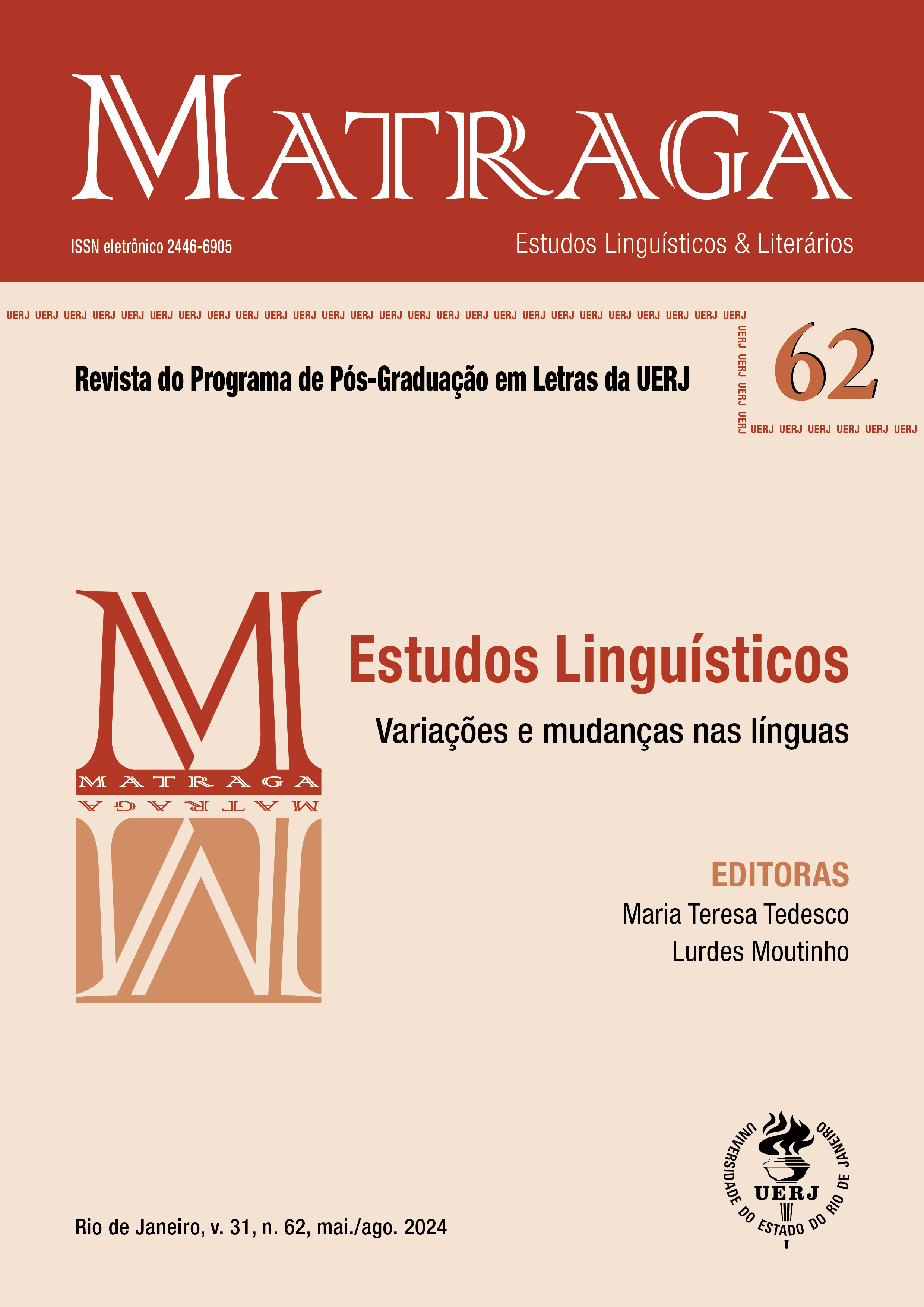Brazil-Portugal: variation and change in the designations of our daily bread
DOI:
https://doi.org/10.12957/matraga.2024.80294Keywords:
Brazil, Portugal, comparative study, designations of “bread”, linguistic variation and changeAbstract
A reflection on the interrelations between language, society and culture is developed from the hyponymic designations of the hypernym “bread” in Brazil and Portugal, from a comparative point of view, considering linguistic variation and change, based on recent data. The purpose is to observe occurrences of the semantic field, or rather, of the paradigm of “bread” in both countries, through the linguistic uses of the communities. To aggregate data for comparison, a variety of data in Internet search engines, studies with designations and dictionaries published on both sides of the Portuguese-speaking Atlantic are used. Today, in the digital world, multiple pertinent content with accessible materials and information are available. What linguistic, social, and cultural data do these Brazilian and Portuguese sources of information provide on the lexeme “bread” and its synonyms, or associative derivates? How do they come about? Which Brazilian and Portuguese designations prevail in existing studies? What types of “bread” are referred to in digital content as being Brazilian and/ or Portuguese? What linguistic variation and change are noted in both Brazil and Portugal for a term such as “bread” in the same paradigm, especially for constructions such as “bread x” and “bread of y”? All the motivating questions of the investigation can be reduced to one: What convergent and divergent names exist for the “bread” in Brazil and Portugal, beyond the lexeme “bread” itself?
Downloads
References
CASTELEIRO, João Malaca (Coord.). Dicionário da Língua Portuguesa Contemporânea. Lisboa: Acade¬mia das Ciências de Lisboa e Verbo, 2001.
COSTA, J. Almeida e MELO, A. Sampaio e. Dicionário da Língua Portuguesa, 8.ª edição revista e actualiza¬da. Porto: Porto Editora, 1998.
DUBOIS, Jean (Coord.) Dictionnaire de Linguistique. Paris: Larousse, 1973.
FERREIRA, Aurélio Buarque de Holanda. Novo Dicionário Aurélio da Língua Portuguesa. 2.ª ed. Revista e aumentada. Rio de Janeiro: Editora Nova Fronteira, 1986.
HOUAISS, Antônio. Dicionário Houaiss da Língua Portuguesa. Rio de Janeiro: Ed. Objetiva, 2001.
REBELO, Helena. Os nomes do pão e o património linguístico: uma recolha no Arquipélago da Madeira. In: Das culturas da alimentação ao culto dos alimentos. DIAS, Paula Barata; ASFORA, Wanessa; SOARES, Carmen; GRIECO, Allen (Coords. Eds.). Coimbra: Imprensa da Universidade de Coimbra, vol. II, 2022, p. 197-218.
REBELO, Helena. Pão Madeirense (Hipónimos): Pão da ou na Madeira? Questões Regionais de Cultura e de Património Linguístico. In: Viagens à volta da mesa nas ilhas da Macaronésia: Itinerários turísticos do património gastronómico e vinícola. Duarte Nuno Chaves (Coord.). Ponta Delgada, Açores: Letras Lavadas Edições, 2021, p. 185-200.
SAUSSURE, Ferdinand de. Cours de Linguistique générale. Paris : Payot, 1985.
WEINRICH, Harald. A Verdade dos dicionários. In: Problemas da Lexicologia e Lexicografia. Porto: Livra¬ria Civilização Editora, 1976, p. 314-337.
YIDA, Vanessa. As designações para o pão nosso de cada dia: a norma lexical do português brasileiro com base no corpus do Projeto ALiB. In: Revista de Estudos da Linguagem. Belo Horizonte: UFMG, v. 29, n.º 1, 2021, p. 533-588.
YIDA, Vanessa; ALTINO, Fabiane Cristina. Os fraseologismos para pão francês na região sul do Brasil. In: Estudos Linguísticos e Literários. Salvador: UFBA, n. 60, Núm. Esp., 2018, p. 90-106.
Downloads
Published
How to Cite
Issue
Section
License

This work is licensed under a Creative Commons Attribution-NonCommercial 4.0 International License.
Authorization
Matraga – Scientific Journal of the Post-graduate Program in Arts and Humanities of UERJ is authorized to publish the article submitted here, if it is accepted for online publication. It is attested that the contribution is original, that it is not being submitted to another publisher for publication, and that this statement is the expression of truth.
The works published in Matraga's virtual space – Scientific Journal of the Post-graduate Program in Arts and Humanities of UERJ will be automatically transferred, and your copyright is reserved to Matraga. Its reproduction, in whole or in part, is conditional on the citation of the authors and the data of the publication.

Matraga uses license Creative Commons - Attribution-Non-Commercial 4.0 International.





